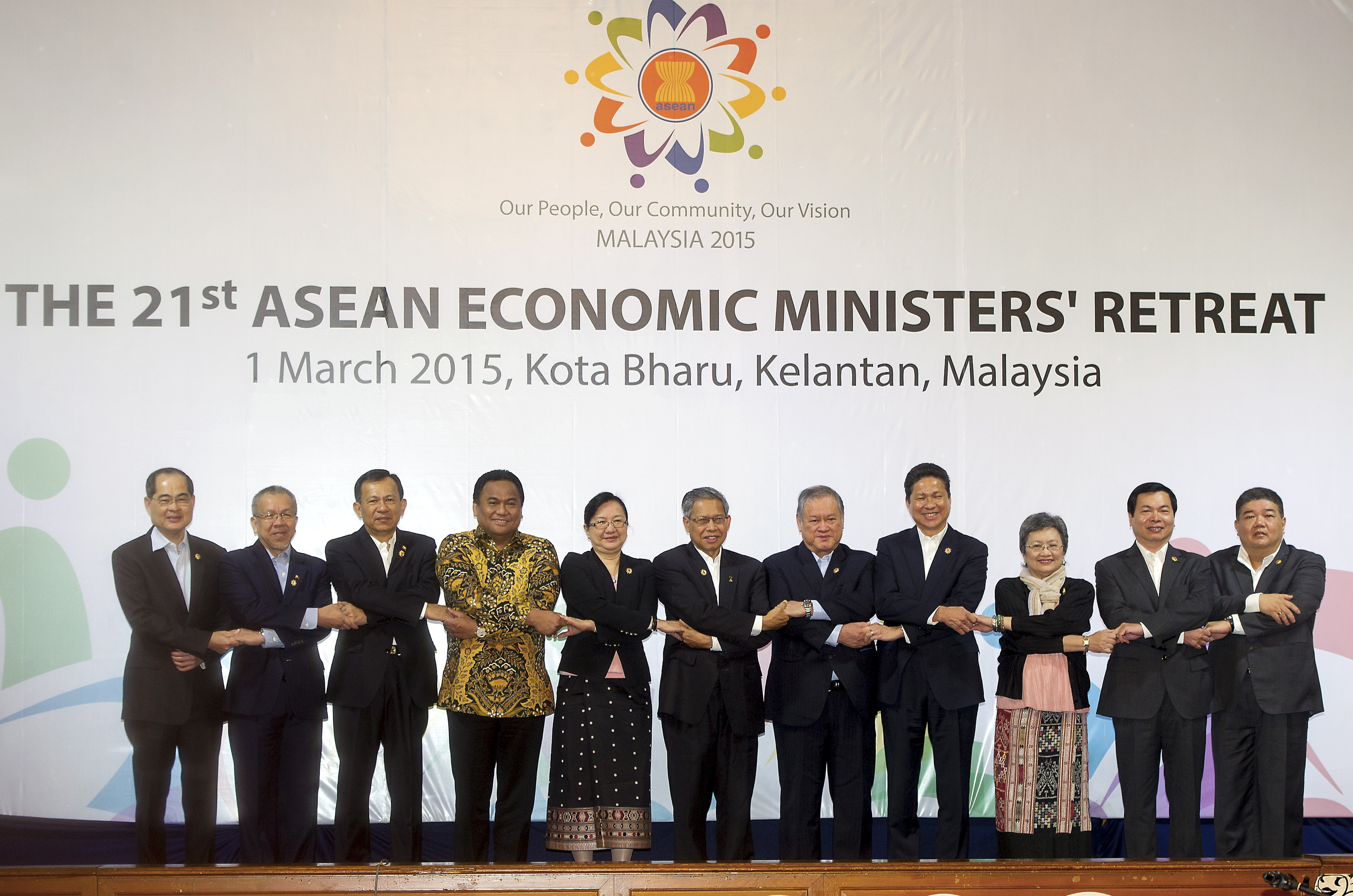ID :
358731
Mon, 03/02/2015 - 05:07
Auther :
Shortlink :
https://oananews.org//node/358731
The shortlink copeid
AEM Makes Steady Progress Towards AEC Blueprint

By Noor Soraya Mohd Jamal
KOTA BAHARU (Kelantan, Malaysia), March 2 (BERNAMA) -- ASEAN economic ministers (AEM) Sunday wrapped up their two-day retreat here with a steady progress made towards implementing the ASEAN Economic Community (AEC) Blueprint, particularly key measures prioritised by member states.
As the regional grouping moves towards the tail-end of the AEC implementation, it has progressively removed trade obstacles such as Non-Tariff Barriers (NTB), which are a clear impediment towards the realisation of the AEC.
"There are a number of highlights (achieved) during this retreat. We'd talked about NTBs, listened to reports on the progress of the economic integration, and spent a lot of time on the Regional Comprehensive Economic Partnership (RCEP)," International Trade and Industry Minister Mustapa Mohamed (centre) told reporters on the final day of the two-day 21st ASEAN Economic Ministers' Retreat (AEM) here, Sunday.
Mustapa, who chaired the retreat, said eliminating non-tariff barriers is very important as emphasised by Prime Minister Najib Razak.
So far, ASEAN managed to settle 45 NTBs out of 69 identified, he added.
Meanwhile, in a joint statement issued after the retreat, ASEAN has put in place legal structures on competition, consumer protection and intellectual property, contributing to an improved environment for business.
"Benefits are already flowing to ASEAN businesses and consumers, from significant tariff liberalisation, progress in trade facilitation measures such as self-certification, simplification of customs procedures, and the Mutual Recognition Arrangements on the movement of skilled professionals in the region," the ministers said.
They concluded that the focus for this year would be on further simplification of Customs procedures, harmonisation of standards, liberalisation of services and trade facilitation, as well as, conclusion of the services and investments portion of the ASEAN-Japan Comprehensive Economic Partnership.
The ministers also discussed the progress in developing the SME Strategic Action Plan, with a specific focus on micro and small enterprises, and the promotion of globally accepted regulatory practices.
The progress in developing a comprehensive vision for the AEC beyond 2015 were also deliberated during the retreat.
The AEC would require further enhancements to meet the demands and challenges over the next ten years, thus ASEAN needs to constantly innovate and strengthen itself to ensure that the region continues to be globally competitive.
"We have discussed the outline for ASEAN post-2015. It is still work in progress, but it will make ASEAN more attractive for business. We're now number seven in the world.
"In terms of economy, we are the fastest growing, exceeding five percent. We're convinced that ASEAN will become one of the most dynamic regions in the world," Mustapa said.
On the RCEP, he said seven rounds of negotiations had been completed since its commencement in 2013.
"The next meeting will be in Kyoto, (Japan) but before that there will be a meeting in Jakarta in April," Mustapa said.
Among outstanding issues yet to be finalised are those on trade in goods, trade in services and investment.
When concluded, the RCEP will link the economies of ASEAN, Australia, China, India, Japan, South Korea and New Zealand.
The envisioned grouping will account for half the world’s population and almost 30 per cent of the global economy.
Noting the complexities of this significant undertaking, the ASEAN economic ministers reiterated the commitment to complete the negotiations by year-end.
During the retreat, the ministers also welcomed the strong contribution of the private sector and other stakeholders to the work of the AEC.
The recommendations of the ASEAN Business Advisory Council and other private sector organisations would be reviewed to further fostering and facilitating trade and investment opportunities in the region and beyond, Mustapa said.
On the current economic situation, the ministers expressed confidence that the region's economies would maintain their momentum in 2015 despite the global economic and geopolitical challenges.
ASEAN's economic performance is expected to improve 5.1 per cent this year, above the 3.5 per cent global growth projection.
This is based on the stronger demand in advanced economies, energised by the robust US recovery and several policy stimulus measures in Eurozone and Japan.
The ASEAN economic ministers have been huddled here from Friday for a crucial meeting to advance plans for the establishment of the AEC.
Malaysia assumed the ASEAN chairmanship on Jan 1, taking over from Myanmar and its theme for the chairmanship is "Our People, Our Community, Our Vision."
ASEAN (the Association of Southeast Asian Nations) groups Brunei Darussalam, Cambodia, Indonesia, Laos, Malaysia, Myanmar, the Philippines, Singapore, Thailand and Vietnam. (photoBERNAMA)
-- BERNAMA





